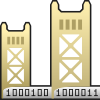|
 |
|
Example Grammars |
| Hex
Literals |
This grammar shows how to define Hex
Literals in your grammar. The formats used for C++ and Visual Basic are
included |
|
Identifiers |
This is a very simple example which
defines a common identifier. |
|
Numbers |
Besides identifiers, programming
languages often contain terminals for integer and floating point
literals. This grammar defines both. |
|
Simple |
This is a very "simple" grammar that
was used in the Visual Basic Example
project. The grammar contains a few basic statements as well as the
rules for basic mathematical expressions.
|
|
Strings |
One of the most common declarations
used in programming languages is the "string". In this example, a
character set is defined and then used to declare a standard string
terminal. |
|
Strings (C style) |
The C programming language uses a
backslash to define special characters normally not accessible via the
keyboard. This grammar shows how to define a String terminal which will
accept C style strings. |
|
Operator Precedence |
This grammar contains the basic rules
needed to define mathematical expressions. It includes the levels of
operator precedence used in common arithmetic. |
|
Phone Number |
This is a very simple example that
parses U.S./Canada style phone numbers. |
|
Programming Languages |
|
ALGOL 60 |
ALGOL is, by far, the most influential
programming language developed to date. Although is did not achieve mass
use, a large number of syntactic and semantic principles and concepts
were developed and incorporated into the language. These include:
block structure, free-form structure (elements are not required to be in
a specific column), pass by name and the For-Loop. As a result, ALGOL is
considered the main reference language in computer science. |
| BASIC
64 |
BASIC is one of the oldest programming
language and one of the most popular. It was developed in 1964 by John
G. Kemeny and Thomas E. Kurtz to teach students the basics of
programming concepts. |
| C (ANSI) |
C was designed for the creation and
implementation of low-level systems such as operating systems, device
drivers, firmware, etc... To realize this goal, the language contains
the ability to perform operations directly on memory and has direct
access to system pointers. While this gives an enormous amount of
control and flexibility, it also makes C a professional programming
language - not to be used by an inexperienced programmer. |
| C# |
Updated!
C# was primarily the work of computer scientist Anders Hejlsberg who has
worked on a wide range of programming languages. These include, but are
not limited to, Visual J++, Borland Delphi and Turbo Pascal. His
previous works and influences from Java and C++ can be seen in C#. The
goal of C# was to counter the flaws and difficulties found in Java and
C++. In addition, the language was designed to work well with the Common
Language Runtime which runs the Microsoft .NET platform.
The grammar was designed, in part, using the official language
specification that can be found on the Microsoft website. As a result,
considerable time was required to write a LALR(1) compliant version. |
| COBOL
85 |
The COBOL programming language is one
of the oldest still in use today. It was originally designed by the
United States Department of defense under the supervision of the
Conference on Data Systems Languages (CODASYL) Committee. Most of the
groundwork and design of COBOL was done by Admiral Grace Hopper of the
United States Navy. The COBOL 85 grammar is complex - containing, on
average, over 350 reserved words, 950 rules which results in 1,681 LALR
states. This is the full grammar. |
Commodore
PET BASIC |
This version of the BASIC Programming
Language was implemented on the Commodore 64. I wrote this grammar to
amuse myself and to remember the fun I had on that 8-bit wonder.  You
can also download a True Type Font I created that mimics the character
set of the Commodore 64. This is a new version of the font that will
work for both PC and Macintosh (the old version didn't work that well). You
can also download a True Type Font I created that mimics the character
set of the Commodore 64. This is a new version of the font that will
work for both PC and Macintosh (the old version didn't work that well).
|
|
Delphi 7 |
Rob van den Brink, who authored the
Object Pascal Engine, created the grammar for the Delphi 7 Programming
Language. Delphi was developed from the concepts and syntax of Pascal
and, its successor, Object Pascal.
|
|
Java |
Dmitry Gazko has submitted a grammar
for the Java Programming Language This grammar is based on a partial
conversion of Sun Java 1.0-2.0 specification.
|
|
JavaScript |
Meinhard Schnoor-Matriciani submitted
this grammar for the JavaScript Programming Language. The grammar has a
few shift-reduce warnings - mainly due to the classic hanging else.
|
| LISP |
LISP is one of the oldest programming
language in use today; second only to FORTRAN. It was invented by
mathematician John McCarthy and organizes data into abstract "lists";
which are delimited by parenthesis. This metaphor is used for both data
and functions and yields a degree of orthogonality not seen in most
languages. |
|
Pascal |
Alexander Grau submitted the grammar
for the Pascal Programming Language. Pascal was developed by Niklaus
Wirth of the ETH Technical Institute of Zuerich in 1970-1971.
|
|
Smalltalk IV |
The Smalltalk programming language was
developed at the Xerox labs at Palo Alto in the mid 1970s. The language
was built upon the object-oriented model of Simula and designed to work
directly with the newly developed concept of the graphic user interface
(GUI), To this day, Smalltalk is considered one of the "purest"
object-oriented programming languages. |
| SQL
89 (ANSI) |
The SQL programming language was
developed as a uniform means of modifying and querying relational
databases. By using a single abstract language to interact with the
database, programs can be written that are independent of the vender and
format of the database itself. |
|
VB Script |
Updated!
Vladimir Morozov submitted a grammer for the Visual Basic Scripting
Language - VB Script. This is a version of Microsoft Visual Basic that
can be used in webpages or for scripting tasks in Windows. Vladimir
Morozov worked with Nathan Baulch on a number of updates which take into
account some real-world scenaros. These include the use keywords as
identifiers, the use dot in front of identifiers in WITH statements
(grammar allows to use them anywhere), missed statements, parameteres
for calling SUB, and much more.
|
|
Visual Basic .NET |
Visual Basic .NET is the latest version
in the long evoluation of the BASIC programming language. The Visual
Basic .NET programming language is far more "clean" and orthagonal than
its predecessors. Although some of the old constructs exist, the
language is far easier to read and write. Only use GOLD Parser Builder
version 2.1 and later to compile this grammar. Earlier versions cannot
handle the complexity. |
|
Academic Languages |
|
Brainf#ck |
As legend states, the Brainf#ck
Programming Language (also called BF by those not wanting to curse) was
created by Urban Müller in 1993. The
language was designed, in part, so Müller
could create the smallest compiler ever. The first BF compiler was
written for the Commodore Amiga OS 2.0 and was only 240 bytes in size.
The BF Programming Language only consists of 8 different instructions,
an array and a pointer. Note: This grammar was written as an example.
For such a simple syntax, it is far easier to manually write a
specialized parser. |
| PL/0 |
PL/0 is a simple programming language
created by Niklaus Wirth in his 1976 book Algorithms + Data
Structures = Programs. Essentially, the grammar is a subset of
Pascal and Modula-2 (both which Niklaus Wirth created). Most programming
language features such as functions, parameters, looping statements,
etc.. were removed.
|
|
Oberon-00 |
"Oberon-00 is a simple programming
language proposed in [Wirth98] as a simple example of a common language
that can be used for hardware and software compilation. Such language
could be used for research purposes in the field of high-level synthesis
(HLS) and as a testbed for hardware-software codesign. Oberon-00 is
derived as a hardware-friendly subset of Oberon. This package contains
both a regular BNF grammar derived from the Oberon-00 EBNF, which can be
used within the GOLD environment and the original EBNF."
|
| File Formats |
| Cascading
Style Sheets |
Cascading Style Sheets was originally
proposed in 1994 by Hakon Wium Lie during "Mosaic and the Web"
conference in Chicago. Shortly afterwards, Hakon Wium Lie teamed up
with Bert Bos who was developing a web browser called "Argo". Together
the format of the first Cascading Style Sheets was developed and, with
Thomas Reardon of Microsoft, was submitted to the W3C Committee in late
1996. |
|
Graphviz (aka Dot) |
This grammar, submitted by Richard
Scheider, is for a graph language from AT&T known by the names Graphviz
and Dot.
|
| HTML |
This grammar requires little
explanation - being the dominant format used for websites. Like XML,
HTML is a descendant of SGML (Standardized General Markup Language).
This grammar was mainly written as an example. Those parsing HTML
documents should incorporate a simple stack rather than using a parsing
system. |
|
JSON |
JavaScript Object Notation (JSON) is a
text file format that was created for data-interchange between different
programming languages. The conventions of the format is based on the C
programming language and, as a result, should be familiar to programmers
of C++, Java, and C#.
|
| XML |
XML, like the commonly used HTML
format, is a descendant of SGML (Standardized General Markup Language).
However, XML is not a descendant of HTML and structural differences
exist between the two formats. XML has been adopted by leading software
companies including Sun Microsystems and Microsoft for their SOAP
framework. |
| Miscellaneous Grammars |
|
Commandline Argument |
This is a grammar submitted by Alex K.
Angelopoulos that is designed to be similar to the parsing performed by
WScript.
|
GOLD Grammar
(Official) |
This is the official grammar
that is used internally by versions 2.6 and later of the GOLD Parser
Builder.
|
GOLD Grammar
(Matt Hounsell) |
Mathew Hounsell submitted a grammar
that parses the Grammar Outline used by the Builder. This is a very
clean design.
|
|
Pokchi/J |
Christian Beaumont submitted a grammar
he wrote called "Pokchi/J". This grammar defines a JavaScript like
language with some C# like extensions.
|
|
Regular Expressions |
This very simple grammar will parse
regular expressions. Unlike the grammar used for the GOLD Builder
scanner, this grammar treats each character as a different token. |
| YACC |
One of the oldest and most respected
parsing engine generators available to developers is YACC. Like "vi"
"grep" and "awk", this software is considered the de facto standard in
the UNIX world. YACC, which is an acronym for Yet Another
Compiler-Compiler, was developed by Stephen C. Johnson at AT&T. YACC can
be used to create parsers using the C and C++ programming languages. |
|


![]()


